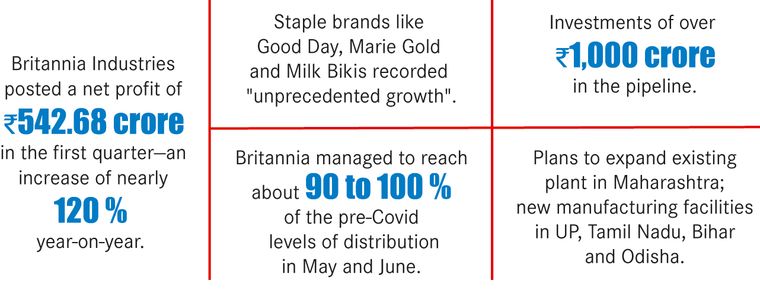A century-old company with an annual revenue of more than Rs9,000 crore, Britannia Industries is a household name in India and more than 60 other countries. Its products—ranging from biscuits and bread to beverages and dairy products—are available in five million retail outlets across India.
For the quarter ended June 30, Britannia posted a net profit of Rs543 crore—more than double what it earned in the corresponding period last year. Managing director Varun Berry, who had joined the company in 2013, has helped the company weather the Covid-19 lockdown. A mechanical engineer by training, he has more than 27 years of experience in companies such as Hindustan Unilever and Pepsico. In an exclusive interview with THE WEEK, he talked about the company’s growth strategy.
Excerpts:
How has the pandemic affected the packaged food segment in India?
Some sectors like FMCG have stayed more resilient than others, despite operational challenges. Steady demand kept consumer product companies relevant through this period. Britannia was categorised within the essentials goods category and we were given permissions to operate even during the lockdown. In the initial weeks we were restricted by supply chain blockages, shortage of labour and insufficient transport facilities. We set to iron out the operational hazards.
With people cooking at home and children staying indoors, demand for ready-to-eat and ready-to-cook foods shot up. People were restricting their movements to the neighbourhood grocery stores and stocking up essential supplies. We focused on our staple brands like Good Day, Marie Gold, Milk Bikis and Nutrichoice. With the exception of some of the more ‘on-the-go’ categories, such as salted snacks and dairy drinks, all others saw solid growth.
What factors contributed to your growth in the lockdown period?
In disruptive times like these, consumers seek out brands they trust. So our brand equity proved to be a strong asset. The biggest contribution to [Britannia’s] growth came from our teams across the country. They enabled sales orders in real time, ensuring a close connect with our customers, distributors and retailers.
We facilitated picking up of stocks from distributor points, wherever stocks could not be delivered to retailers. We also facilitated direct supplies to distributors from our warehouses, despite it being a bit expensive [from our] standpoint. Such measures ensured that our products were available in the market ahead of others. We were able to service 100 per cent of our distributors within the first fortnight of the lockdown.
Quick digital interventions were also key. We partnered with Dunzo and launched a ‘Britannia Essentials Store’ to enable seamless delivery of products. We also launched a WhatsApp-based store locator service. These timely tech solutions helped us respond swiftly to the surge in demand.
Have things stabilised on the production front?
We were quick off the block to resume production and the labour situation has been streamlined. We are producing to capacity now and meeting demand across all geographies.
What new products are in the pipeline?
Our R&D centre in Bengaluru is working on some very exciting innovations. In the next six months or so, we will look at launching products that cater to the demand for health and boosting immunity. These will be in the biscuits and dairy segments.
What kind of new normal are you expecting in the processed food segment?
Our revenue growth in Q1 this year can be attributed in large measure to the increase in home consumption. In the last couple of months, we have seen unprecedented growth for highly salient brands such as Good Day, Marie Gold, and Milk Bikis. Our cheese portfolio is also riding the trend of in-home cooking, and we are doing a YouTube series with Saif Ali Khan on [making] cheese-based dishes.
Increased home food consumption, coupled with an increased interest in health and immunity products, would be here to stay. Consumer preference for proximity shopping [will be] the new normal. Neighbourhood mom-and-pop stores have always been the backbone of India’s retail economy. They have ensured a steady supply of essentials in the country. E-commerce is also emerging as a grocery platform of choice, predominantly in cities.
What new expansion initiatives are you planning?
We are looking at a capital expenditure of around Rs700 crore over the next two and a half years [to build] greenfield facilities and expand capacities in our existing plant in Ranjangaon, Maharashtra. New manufacturing facilities are also being planned in Uttar Pradesh, Tamil Nadu, Bihar and Odisha. These new facilities will increase Britannia’s capacity by 10 to 15 per cent. We have also mapped an additional Rs300 crore for new launches.
What are your interests and hobbies, and how do you spend your free time?
I enjoy a good game of golf, as it helps me re-centre and focus on the day’s priorities. Also being a movie buff, I enjoy some quiet downtime in a fully-fitted home theatre.
When I joined Britannia in 2013, there was a lot of anticipation. With a remarkable team by my side, we have been able to transform the company into a leading global total foods company. Agility, adaptability, consistency and resilience are the traits I hone in the team. Safeguarding consumer trust and delighting them with good products are our endeavour.



